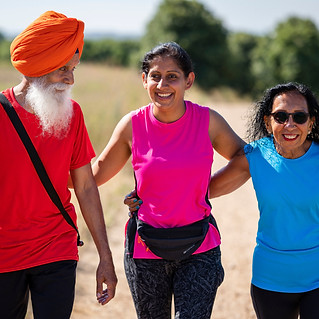
Frequently asked questions
You asked it, we answered it
Q: Define loneliness
We all feel lonely at times – it’s a natural human emotion. We're biologically wired for social contact, and loneliness is our signal that we need more. A helpful definition: Loneliness is a perceived mismatch between the quality or quantity of social connections that a person has and what they would like to have [1].
Q: Is loneliness normal?
Absolutely! Loneliness is a part of life and something that most of us experience at some point. It can feel horrible and embarrassing, but there is nothing to feel ashamed about. It’s human to feel lonely, and there are always things you can do to feel better.
Q: How do I know if I'm lonely?
Loneliness means different things to different people. But there is a general sense of isolation or disconnection from others or a feeling we are lacking or missing social connections and companionship. Loneliness is normally situational, as opposed to depression or anxiety, which can be a constant or all-pervasive feeling we have, no matter what is going on in our lives. We can also feel lonely when we’re not alone, which can feel counterintuitive and confusing.
Check in with yourself and try to observe your feelings and emotions. These questions are a good starting point.
-
Do I feel like I’m missing social contact with others?
-
Do I feel like spending time by myself is a negative experience?
-
How much regular contact do I have with family and friends?
-
Do I have positive and supportive relationships in my life?
-
How does contact with your friends and family make you feel? (positive and happy or saddened)
-
Do I feel like I’ve lost my confidence and social skills?
-
Do I feel like I have a negative view of myself and others?
Research shows that we can start to fall into a cycle of loneliness: the longer we feel lonely the more we start to isolate ourselves. We can start to feel like there is something wrong with us, or that the world is an unfriendly and scary place when that normally isn’t the case at all. First and foremost, loneliness is a normal human emotion. Left unchecked, chronic or long-term loneliness can develop into a mental health condition like anxiety or depression.
Q: Does being lonely mean there is something wrong with me?
Not at all. Loneliness is a normal emotion, just the same as feeling happiness or joy. The trouble is, most of us aren’t as comfortable with the ‘negative’ emotions like loneliness, anger and envy as we are with the ‘positive’ ones. (There are no good and bad emotions, by the way, they’re all part of the emotional spectrum). Sometimes in life, for whatever reason, we don’t have the right amount of social connections or the emotional depth to our relationships that we need. Our lonely feelings are there as a prompt for us to connect or reconnect with people in positive and meaningful ways.
Q: Who is most likely to experience loneliness?
Most of us will experience loneliness at some point in our lives, regardless of age, circumstance and background. We all experience loneliness differently. It’s a common misconception that loneliness is limited to older people. In fact, 16-24-year-olds are the loneliest age group in the UK. [2] A survey from Nextdoor in partnership with Marmalade Trust revealed that 85% of UK adults had experienced loneliness in the last 12 months. Almost half (44%) felt chronically lonely. [3]
Research suggests that some people are more vulnerable to loneliness than others. Examples of this include people who:
-
Have no friends or family, are a single parent or care for someone else
-
Belong to a minority group or live in an area where there aren't many people with a similar background
-
Are excluded from social activities because of mobility problems
-
Don't have much money for certain social activities
-
Experience discrimination and stigma because of your gender, race or your gender or sexual identity
-
Have experienced any kind of abuse, including neglect, which may make it find it harder to form close relationships with other people.
Q: Do I look lonely?
In general, no. Loneliness is more something we feel internally rather than something we wear on the outside. Our lives can look a certain way; we may appear busy or have things to do, but that doesn’t mean we can’t feel lonely. Maybe we don’t leave our homes much, either through choice or circumstance, and people may assume we prefer to be left alone. Chronic long-term loneliness can start to affect health and wellbeing.
Q: Can I feel lonely around friends and family?
Yes. Loneliness is to do with the quality and quantity of your relationships and social connections. You can still feel lonely if you feel like you are not being acknowledged or understood by those around you. You can feel lonely when the relationships in your life are lacking in emotional depth, if you’ve grown apart from someone or if communication has broken down.
Q: What can I do to help someone who is lonely?
You don’t have to specifically ask if someone is lonely. Instead, ask if they are ok. Take time to listen to how they are feeling and ask if there is anything you can do to help. Don’t always treat a lonely person passively: maybe ask them to help or get involved with active tasks instead. When you’re lonely you don’t want to feel like you’re a burden, or that someone is doing something out of a sense of obligation. Being involved in something like a community project, volunteering or even helping with a family dinner gives a person a sense of belonging and makes them feel that their contribution is valued. We all like to feel useful and part of something. You can read more about how to talk about loneliness here >>
Q: Is loneliness permanent?
No. Loneliness is something that comes and goes through life, mostly when we experience change. Most loneliness is temporary and is always fixable. In a survey, we asked Year 2 children in the UK if they had ever experienced loneliness. Many said yes, such as: “When Jimmy wouldn’t play with me on the monkey bars.” When we are younger we are better at identifying and naming our feelings, it is only as we get older that factors like social conditioning and stigma make us feel that they’re something to feel embarrassed about.
Q: Can I still laugh and have fun when I'm lonely?
Absolutely! We don’t lose our sense of humour or stop finding things funny when we experience loneliness. Lonely people aren’t inherently depressed and miserable people. We just haven’t got the social or emotional connections we need in our lives – and laughing is a good way back to that!
Q: What is the difference between being lonely and being alone?
Loneliness is something you feel that you have no control over and it feels like a negative experience. Being alone is an active choice: we choose to spend time by ourselves to rest and recharge, or to enjoy our own company and it is largely a positive experience (boredom can come into it too). Alone time, or downtime, is especially important in today’s world, where lots of us feel like we have to be ‘on’ the whole time. But the truth is that loneliness is a two-way street. We might find ourselves in a situation where we feel lonely – the next step is working out how we can change that.
Q: Can I use social media to feel connected?
Yes, it’s just about how you use it and how much you use it. Use social media in a positive and proactive way: join online groups, build a social network, take part in discussions, find out information or feel inspired by something someone else is doing.
How does using social media make you feel? A shared Whatsapp group might make you feel part of a network and a positive interaction but does endless scrolling on Facebook make you feel like you are missing out? Are you swapping social media for real-life connections with friends? If we just use social media passively and ‘compare and despair’ our lives to others, we are going to feel even more disconnected. Read more about using social media well.
Q: Are there different types of loneliness?
Even though the feeling of loneliness might be the same, there is no ‘one size fits all’. Loneliness can mean different things to different people. We can feel physically lonely or isolated, where we don’t see or speak to people, and there is no one in our lives regularly. We can feel situational loneliness after a life event: i.e if we have been bereaved or have moved school or job. We can feel lonely even when we have other people in our lives: emotional loneliness is when we feel unseen, misunderstood or disconnected from our family, friends, partners and co-workers. Or we can feel a sense of long-term internal loneliness, no matter what our external circumstances are. In this case, it may be worth exploring further with a mental health expert such as a therapist or counsellor.
Q: What are the signs and symptoms of loneliness?
Loneliness is a normal human emotion which feels different for each of us. For some, it might feel like longing for something or feeling like you're missing out. For others, it might feel like no one truly understands you or is there for you. Sometimes it feels like you're completely alone, even if you're surrounded by people. If you've been lonely for a long time (chronic loneliness), you might experience decreased energy, an inability to focus, insomnia, feelings of self-doubt, hopelessness, or worthlessness. You might even feel cravings for physical warmth, such as hot drinks, baths, or cosy clothes and blankets. Some people feel body aches and pains and a decreased appetite.
Q: What can I do if I feel lonely?
Be kind to yourself. Remember that loneliness is a normal human emotion that many of us experience. Think about what you can do in the immediate moment: Do you have friends, family, work colleagues, or support workers you can reach out to?
If you don’t feel comfortable telling someone you’re feeling lonely, you can always say you rang up for a chat and that going forward, you feel like you’d benefit from more company. Otherwise, is there a local group or club, or online community you could join? Can you pick up the phone and reconnect with old friends? If you have been experiencing chronic long-term loneliness and it is having a detrimental effect on your physical and mental health, talk to your GP or health worker.
You don’t have to have a big scary life overhaul or do something dramatic - it’s about taking small steps to feel more connected. Our simple and effective three-step approach will help you identify how you’re feeling and what you can do about it.
-
Realise you are feeling lonely and that it’s nothing to feel embarrassed about.
-
Recognise the effect it is having on you and your life.
-
Reach out. Tell someone how you are feeling, build up your daily community or seek relevant advice and support.
You can read more about our three-step approach here.
References:
[1] BBC Loneliness Experiment: ‘Why 16-24 are the loneliest group’
[2] BBC Radio 4, All In The Mind. “The Loneliness Experiment”. (2018)
[3] Nextdoor, Marmalade Trust. "The silent epidemic". (2023)
[4] Office of National Statistics: ‘Circumstances and characteristics associated with loneliness’
.png)



.jpg)